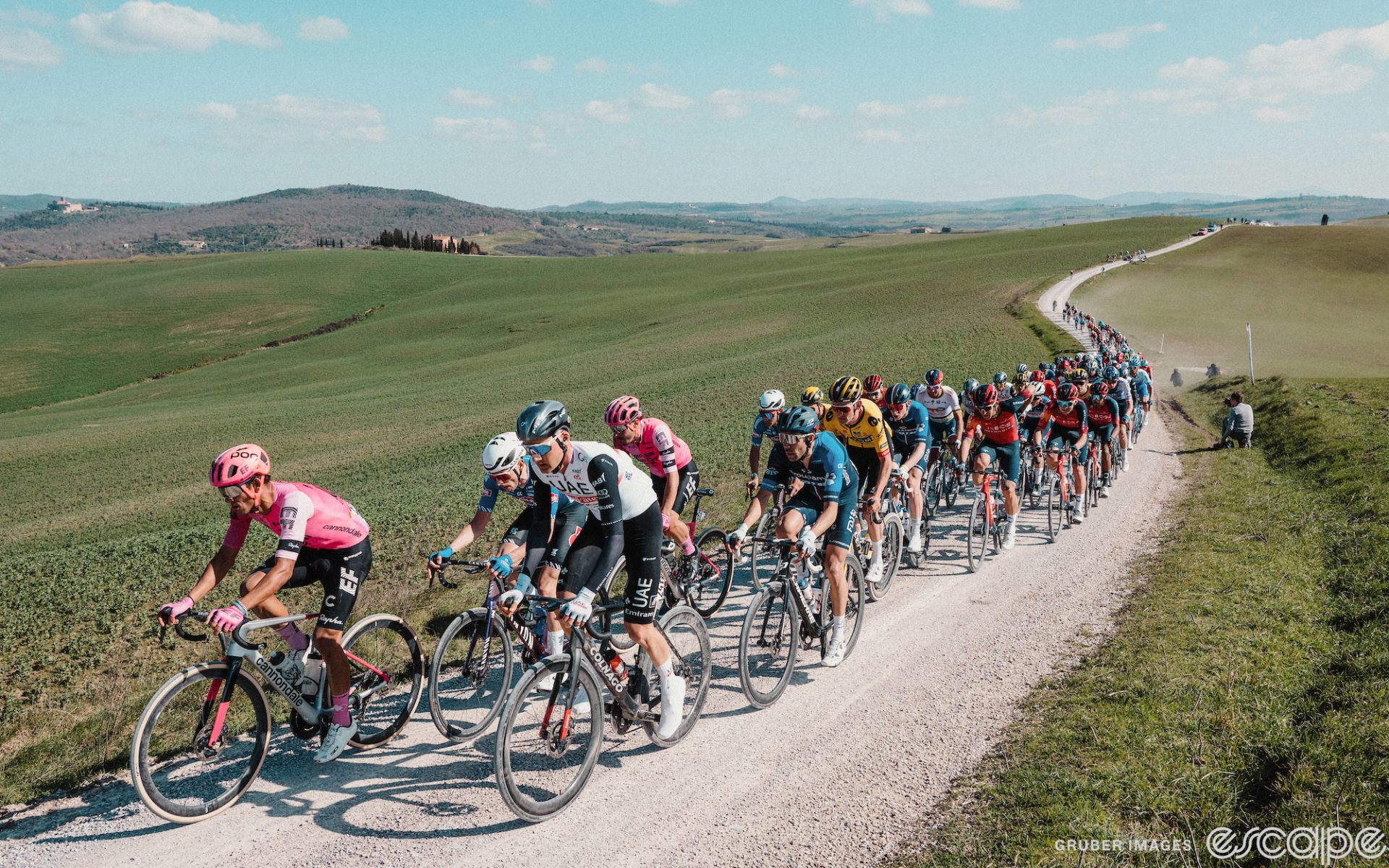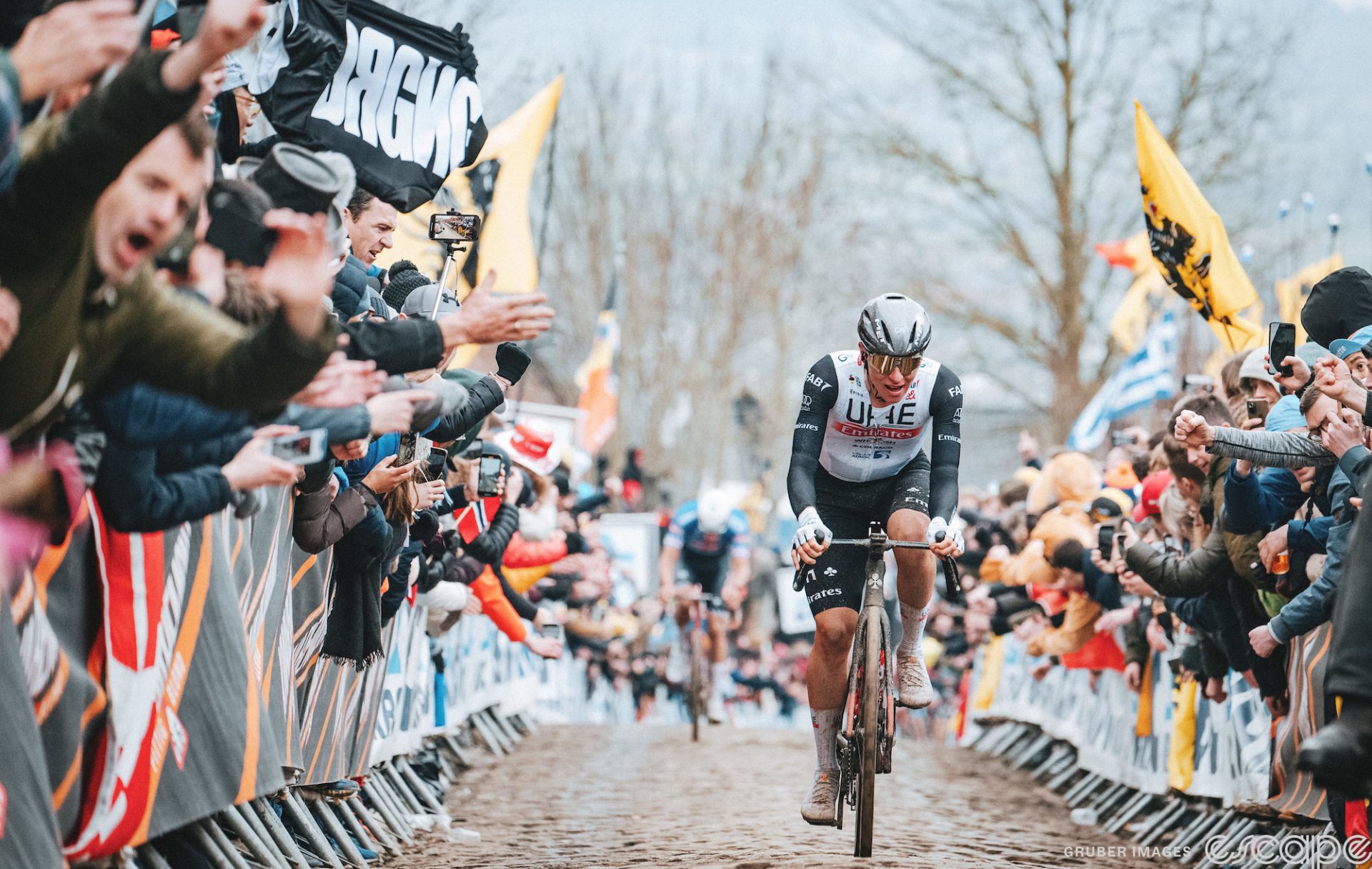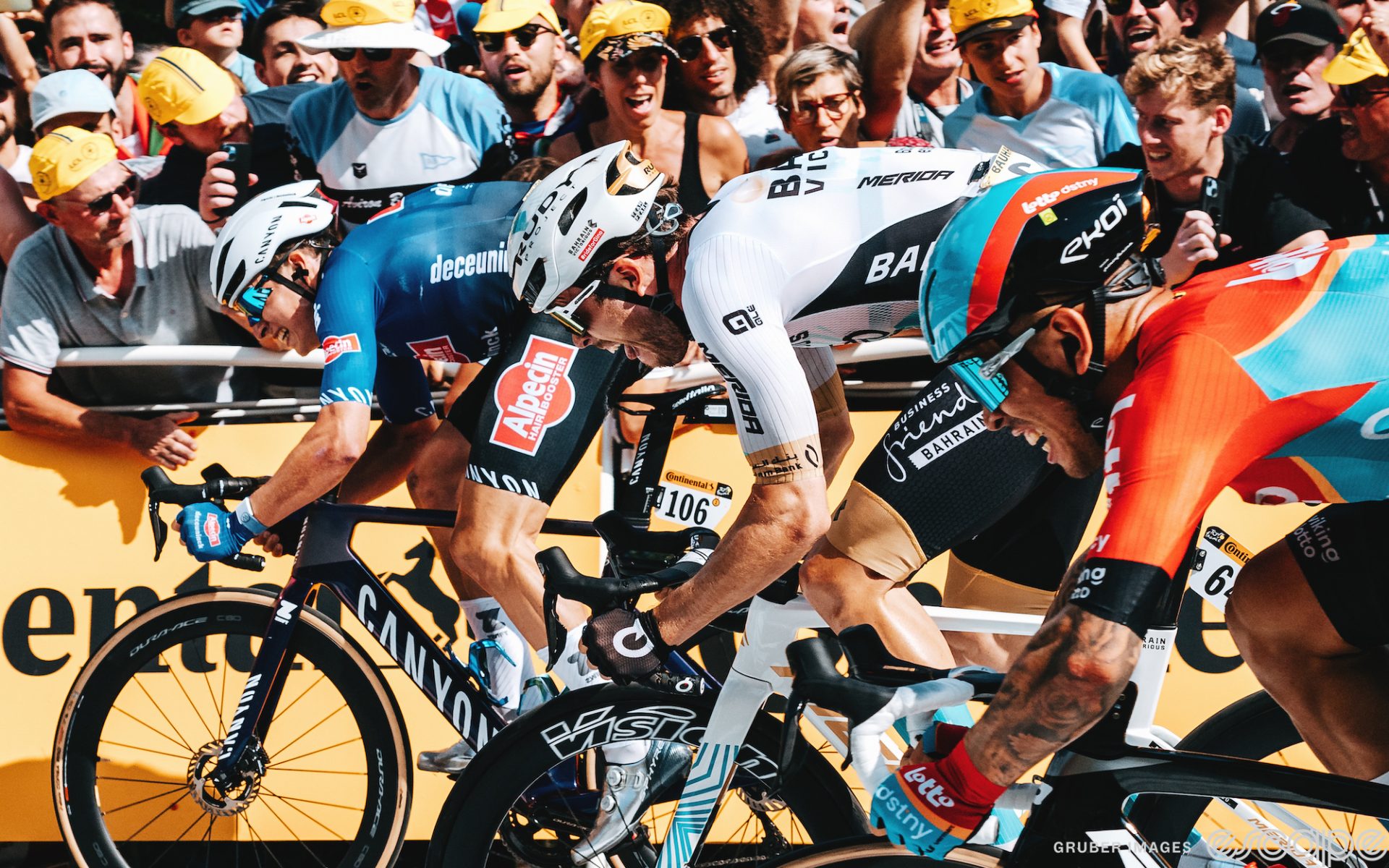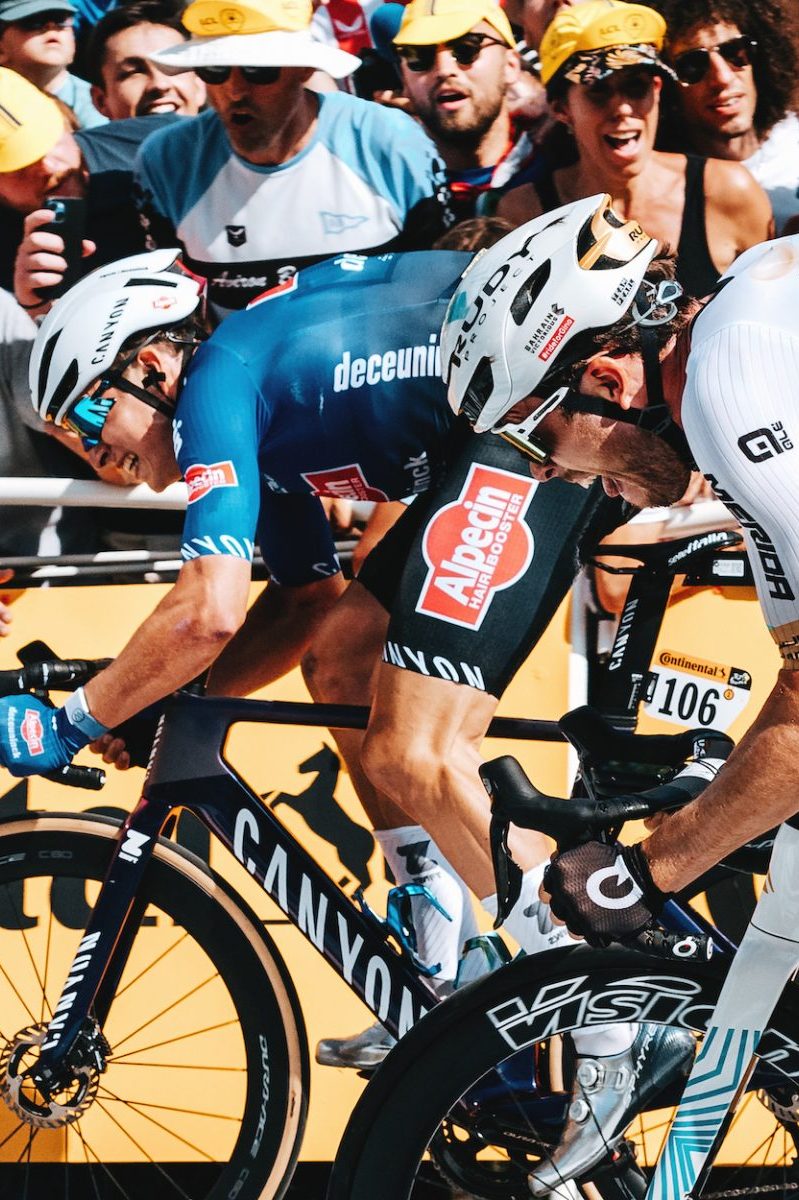With the 2023 road season pretty much wrapped up, the “final” UCI road rankings are in and there are a few surprises. If you’re wondering how UAE Team Emirates somehow bested the Avengers-like Jumbo-Visma for top team, or why Astana managed even 20th, Dane Cash and Joe Lindsey dive in to try to find some answers. Rest assured, even though this is preposterous, we’ll keep it civil; there will be no Crab Rangoon, things of that nature.
Joe Lindsey: So, now that the racing season is substantially finished (there are a few minor events but only a few and nothing more than a 2.1), the “final” UCI rankings are out and I think I was as confused as anyone that UAE Team Emirates was on top, and with a comfortable 1,300-point advantage over Jumbo-Visma. How’s that possible? Jumbo won 69 races this year – 12 more than UAE – and won almost every major stage race on the calendar. That wasn’t the only head-scratcher in the rankings, but it underlined to me how screwy this whole thing is. What gives? I’m bad at math, but how is this even possible, let alone right?
Dane Cash: Wow, what a great question, Joe! Hopefully if I stay overly friendly and positive, the readers will forgive me for deciding to defend the UCI’s rankings. I assume that the default position here is that the points system is broken at best, if not downright dumb, so if I can just convince you to consider the other side, I’ll call that a success. Right then. What gives is that UAE earned that top spot and it really isn’t that much of a surprise. Jumbo dominated the top steps of the Grand Tour podiums (podia?) but UAE took two Monuments and also put more riders on the Tour de France podium.
Joe: Right – to answer the question you’ve got to dive into the rankings and the way points are structured and awarded. That’s understandably pretty top-heavy not just to the WorldTour, but to certain events in the WorldTour, namely Grand Tours and Monuments. And you’re right, you can make a pretty good living in the rankings mopping up top fives in those events. So I think that’s a lot of where my (and others’) discontent stems from, aside from the reflexive “anything associated with the UCI is capital-B Bad” reactions that I think have now become second nature. It’s not only the UCI rankings that show these results. Some other systems, like ProCyclingStats, also have UAE on top. They also have Bahrain Victorious handily outpointing Alpecin, despite the latter’s clearly superior wins sheet. And I guess that’s the broad point: people really remember wins much more than they do podiums, and so is the way the points system is structured a useful and necessary counterpoint to that, or does it just not make sense? Because it feels like the natural response is, “Wow, that can’t be right,” and yet it is.

Dane: You really took the wind of my sails there by pointing out that other rankings (CQ Ranking too) also have UAE on top. I was hoping to save that for a bit and play it as my trump card to point out that the UCI’s rankings are actually pretty consistent with other systems. Oh well, the point still stands. And that wins vs. podiums (or even top 10s) thing is a big part of it. But you have to reward people for finishing highly even they don’t win. Otherwise, someone who takes a surprise win at Dwars door Vlaanderen and does nothing else will outrank a consistent star who finishes second at the Giro and the Vuelta.
Joe: Man, I really stole your thunder, huh? Apologies for chopping you like an over-eager crit racer. I agree that yes, you do have to reward people for finishing highly even if they don’t win. Or wait, do I agree? Not to get too nerdy (ah hell, who am I kidding?), but that brings up a really salient point: it is, apparently, human nature to focus on winners above all, especially in sports. That’s probably not fair. But elite sports isn’t really about fairness – there can be only one winner in a race. That certainly doesn’t make the other 175 racers losers by any stretch, but I also feel like the UCI points standings is a kind of crude way to try to reflect the value of other placings and roles. This is the era of sports metrics, and I’m personally pretty surprised that this approach is the best thing we’ve created to represent riders’ and teams’ relative competitive merit. I’d love to see, for instance, some kind of analytics on domestiques. But even as basketball, football, and other sports are maybe too much in the analytical weeds of stats like WAR, true shooting percentage, and player efficiency ratings, cycling has pretty much none of that, and the outfits that have tried (like PCS or CQ) haven’t got much further than mostly reproducing the same basic systems as the UCI. I guess what I’m saying is: the UCI rankings often feel natively wrong to people.
Dane: Don’t get me wrong, I’m all about wins too. I’m not suggesting that wins don’t earn a rider far more points than second place. But to bring this back to that UAE vs. Jumbo question, if you finish second and third at the biggest race in the world, surely that’s going to get you a lot of points, right? And it should, in my opinion. Winning should and does get rewarded the most, but runner-up honors are at least worth a significant haul of points.
Joe: Yes, and I think what gets me about the UCI points systems is that winners don’t actually earn a lot of points relative to second or third. For the WorldTour events in particular, the formula is second place gets 80% of the points of the winner and third place gets 65%. You gotta get down to fifth place before you drop under 50% of the winner’s points haul. That feels out of balance to me. I think that’s actually illustrated most clearly not by UAE outpointing Jumbo but by Bahrain finishing two spots ahead of Alpecin in the teams standings. Let’s do some quick comparisons there: Bahrain had 18 victories total, 12 of them WT wins, including stages of all three Grand Tours – not a bad haul by objective measures. But compare to Alpecin: 35 victories, 17 at WT level, including stages of all three GTs (four at the Tour and three at the Vuelta), plus two Monuments, one of which (Paris-Roubaix) featured a 1-2 finish. Bahrain’s other “best finishes” aren’t dramatically better, but somehow they end up outpointing Alpecin handily. Because cycling is both team and individual sport, I can see that rankings get a bit tricky. This isn’t a team sport where you can point to “the team with the best record” as the best team in a regular season, or the team that wins a single-elimination playoff as the best overall team by virtue of winning a championship. But when you see rankings results that are that distorted by a simple, “Yeah, that’s bullshit,” eye test, it suggests to me that at the very least the points structure is off. What say you?

Dane: In terms of giving the winners a greater share of the points haul, I think I agree – at least when it comes down to the judging the system’s ability to produce points standings that pass the eye test for a reasonable end-of-season ranking of riders and teams. But there’s the rub. The points system doesn’t exist solely to tell us who is the world’s number-one rider or team. In fact, the rankings kind of feel like an afterthought, a byproduct of a points system largely focused on providing incentives for teams to race a broader calendar and also on providing a rubric for what teams belong at what division. And those incentives work, by the way, so the UCI has plenty of good reasons to keep the system the way it is. Changes to the scoring system might make for a more acceptable world ranking in the eyes of the public, but on the balance, they could damage the UCI’s broader aims with points in general.
Joe: That raises a really interesting question, Dane: what is the UCI points system for? I’ll give them credit that the individual rider rankings, as well as the stage race and one-day subrankings, seem to make more sense. And I also understand that the nations ranking has its own rationale as far as awarding precious start spots for national-team events like the Olympics and, to a lesser extent, World Championships (lesser extent in that Worlds is a larger field with more overall spots on offer). But that brings us back to the teams ranking, which is what we’re most focused on here. Jumbo, at least, seems pretty intent on winning that title in the years to come. But I’ll be honest, I’ve always viewed the teams ranking as a little bit like the teams competition at the Tour de France: nice yellow helmets, bit of an afterthought behind all the other competitions. It’s the kind of thing teams put in their PowerPoint presentations to non-endemic sponsors. The relegation aspect has made it more relevant, but even then it’s not something people think about in off-years, and even then it’s only an acute concern for the bottom third of the WorldTeams as they try to stay ahead of the cut. So I’m not sure it matters to most of the teams, and fan interest seems to follow suit. Does it have a larger purpose? Or is that enough? What would get us to talk about it with more interest than just relegation or, “Hmm, that seems wrong,” ways like we’re doing now?
Dane: When you get down to it, the real utility and value of the UCI points system is that it allows the governing body to influence which races draw the big names from the big teams. The points go a long way towards giving us a broader and more international calendar. Sure, the Grand Tours and the Monuments don’t need the UCI’s points to attract the stars, but those of us who want to watch more than just the very biggest races are actually pretty well served by the system. For one thing, the one-week stage races and non-Monument classics are still worth a hefty boatload of points, and that gives the heavy hitters further incentive to target them.
More specifically, there are quite a few races outside of the traditional cycling heartland whose very existence is propped up by UCI points. We all know that the Tour Down Under and the Canadian GPs aren’t the biggest events in the world, but personally, I’m a huge fan of being able to watch some bona fide stars on my home continent, and I’m not sure they’d come if it weren’t for the big haul of UCI points always on offer for them in September. That’s true for a few races all over the world, and it’s true not just at the WorldTour level but further down the classification system, where there are still a hefty load of points for ProSeries races, etc. At the end of the day, it is WorldTour points (and the related ranking systems and relegation battles) that help ensure a big international calendar, which hopefully helps grow the sport in the long term.

Joe: That’s a compelling point that the way the rankings are structured (ie. how many points events are worth) is a way for the UCI to shape and steer the calendar. And I agree there is value in a geographically diverse calendar where teams send big-name riders to compete outside of Europe. The tactic of using UCI points to encourage that participation may, however, be an unintended result of another problem, which is that the WorldTour calendar is pretty bloated. That shows in the points structure. Once you get past the GTs and Monuments tiers, races as diverse as TDU, Gent-Wevelgem, and GP Quebec are all worth close to double that of some other races like the six-stage Tour of Guangxi and Eschborn-Frankfurt (and, oddly, Het Nieuwsblad, whose place in the lowest tier seems like an oversight or an insult; I’m not sure which). It’s the UCI’s own tacit admission that not all WT one-days, for instance, are created equal, and that seems like an odd message to send if your goal is to grow the WorldTour into a series of more uniformly important events. But that’s getting into a separate discussion around calendar reform that we’d probably best save for another time. The TL;DR is I’m not really sure that the UCI rankings themselves do much for the internationalization of the sport compared to, well, the inclusion of those races in the WorldTour – which then mandates WorldTeams to race them – to begin with.
Dane: Indeed. The points are just further incentive to send a few more big names to Australia or Canada or Germany or China, and so on, and then those points in turn influence the rankings which may or may not be the best reflection of who the top riders are. And I do think it’s worthwhile to give the stars more reasons to attend events beyond just the very biggest races, so I’m OK with the rankings turning out a bit odd. That said, restructuring the points rubric so that race winners get a bigger share and so that the points on offer for this or that race are a bit more in line with our expectations wouldn’t be a bad thing. When all is said and done here, I’m fine with some of the changes you are proposing, I just know that the UCI will be considering more than just the rankings when making any of these changes.
Joe: I think that’s all pretty fair and reasonable, which of course is no way to have a debate. We really missed a chance to go bulging forehead veins and dueling shouty takes here, didn’t we? In all seriousness, I think the things we agree on are that the system could use a tweak, and that the UCI has broad purposes for it besides simply anointing the top team in the sport or who’s in the churn in the three-year relegation cycle. Beyond that, I’m not sure anyone would be happy with any kind of points standings absent some kind of calendar reform. And to return to my other point, I’d really like to see some folks with better math skills than me create some quality “next gen” analytics. At the very least it would give us something else to discuss in the offseason.
What did you think of this story?


